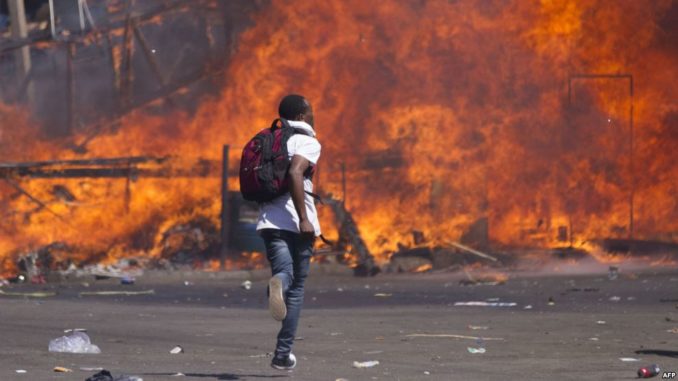
HARARE/JOHANNESBURG — The grievances of the opposition protesters who marched in Zimbabwe’s capital Friday can be summed up in one word: In the Shona language, zvakwana, in Ndebele, sokwanele, and in English, enough.
“The people’s desperation is very deep,’ said former prime minister Morgan Tsvangirai, once considered the nation’s strongest opposition figure.
“It must not relent,” he added. “It must continue to express itself, the level of desperation Zimbabweans are facing so that we are able to solve this problem …But I am very glad that Zimbabweans are beginning to say: enough is enough.”
On Friday, that word drove hundreds of people to converge on the wide avenues of central Harare, where some stopped to tear down a street sign bearing the name of the man who is the target of their ire: President Robert Mugabe.
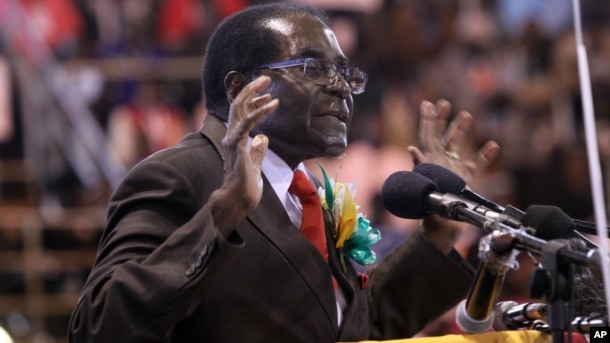
FILE – Zimbabwean President Robert Mugabe attends a meeting with the country’s war veterans in Harare, April, 7, 2016.
Reporters from VOA’s Zimbabwe service were on the scene and reported that protesters blocked roads, burned tires and hurled stones at police, ruling party supporters and buildings in central Harare. The chaos led vendors in the commercial district to shutter their shops.
Despite a court order allowing Friday’s opposition-led protest to proceed, police fired water cannon and tear gas in an attempt to stop it.
Reporters also saw police fire weapons into the air and beat protesters.
A lawyer representing the Zimbabwe People First party, led by former Vice President Joyce Mujuru, Gift Nyandoro, said the police ignored a court order.
“Police are refusing to recognize it,” said Gift Nyandoro. “We inquired them about who’s in charge, they are refusing their name, neither their identity. It’s a bad day for Zimbabwe.”
It was not immediately clear how many people were wounded in the protest.
Police did not answer VOA’s requests for comment Friday, but Zimbabwe’s home affairs minister, Ignatius Chombo, said the night before that police “would not watch foreign-funded protesters destroy Zimbabwe.” The government has long accused Western nations of backing an anti-government plot.
The opposition has called on Southern African leaders meeting in Swaziland to look at the situation in Zimbabwe.
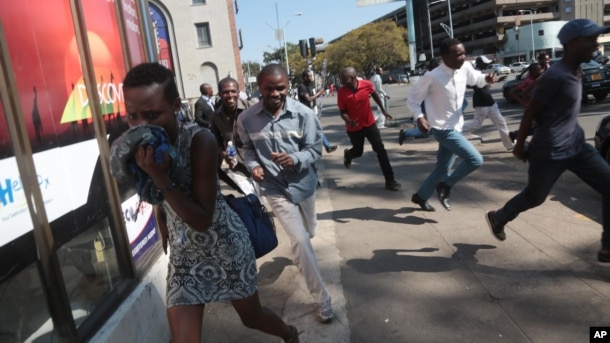
Protesters disperse in Harare, after Zimbabwe police fired tear gas, water cannon and gunshots to stop hundreds of youths rallying against the government of President Robert Mugabe, Aug. 24, 2016.
Protesters in this march and in previous ones say they’re tired of poverty, tired of repression and crackdowns on dissent, and tired of corruption. Most of all, more and more Zimbabweans are saying they’re tired of the man who got them to this place, the man who has ruled the country for more than 35 years: President Mugabe.
For months now, Zimbabwe has experienced a growing wave of protests.
In April, some 3,000 opposition supporters marched in the capital over the failing economy. Other protests sprang up in other locations – including the virtual universe of social media – and around other topical issues.
So far, the demonstrations have been in urban areas. It remains to be seen whether the dissatisfaction has spread to the countryside which has traditionally been a stronghold of the government.
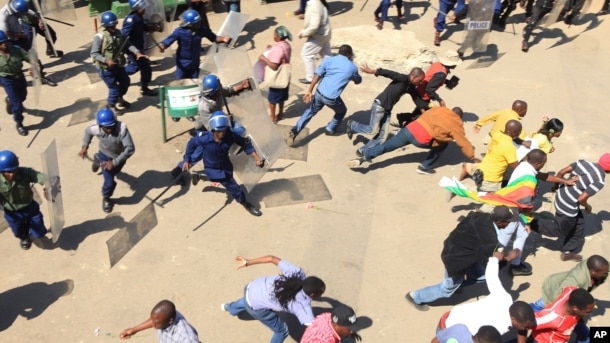
Zimbabwean riot police clash with protesters during a demonstration against the introduction of bond notes by the Reserve Bank of Zimbabwe, in Harare, Aug. 17, 2016.
But Ciara Aucoin, a researcher for the Institute for Security Studies in Pretoria, says although Friday’s demonstration was unusual for its high degree of opposition collaboration, it may not be enough to change anything.
“It isn’t necessarily a tipping point, because it remains to be seen how the pushback from the government is going to affect the protest movement,” she said. “In one way, if it deters protesters, that could be a possible outcome. The other is that if it causes further mobilization – that remains to be seen.”
Instead of looking for the last straw, she said, protesters should be looking for the government’s last penny.
“Because of the budget deficits at the national level, there [are] questions around the ability of the state to maintain the payments to police and to ensure a kind of steady public order maintenance,” she said. “And so, if the protests were to grow, there are questions around the capacity of the state response to pay police who protect public order.”
Human rights groups have long denounced Zimbabwe’s pattern of repression.
Dewa Mavhinga of Human Rights Watch says this year’s protests may have started over basic human and civil rights and the economy, but have escalated because the government’s reaction was to further impede on their basic rights.
“Really this is because of bad governance, poor management by the state and also rampant corruption,” he said. ”So this is what has driven people on to the streets. Unfortunately, the government has not reacted by dealing with the root causes of these protests, but it has chosen to violently crush these demonstrations, further violating people’s rights.”
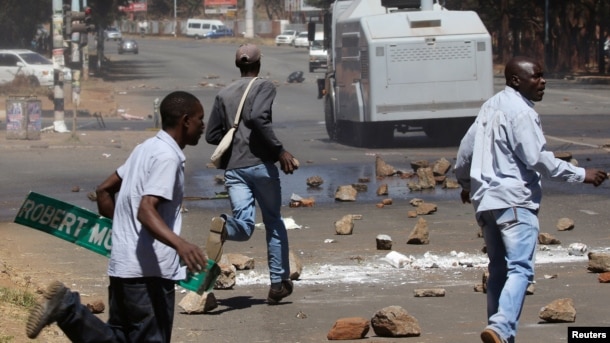
Opposition party supporters clash with police in Harare, Zimbabwe, Aug. 26, 2016.
But protesters say confrontation doesn’t scare them. On Friday, the opposition group behind the latest protest swore: “beat us all you want, but we shall not yield.”
They plan to hold another protest next Friday.
Reporters with VOA’s Zimbabwe Service contributed to this report from Harare.
THE ROTTEN FISH: CAN OF WORMS OPENED OF APC & TINUBU'S GOVERNMENT OVER NIGERIA'S ECONOMIC DOWNTURN
WATCH THE CRITICAL ANALYSIS AND KNOW THE RESPONSIBLE PARTIES TO BLAME FOR NIGERIA'S ECONOMIC CHALLENGES, WHILE CITIZENS ENDURE SEVERE HARDSHIPS.Watch this episode of ISSUES IN THE NEWS on 9News Nigeria featuring Peter Obi's Special Adviser, Dr Katch Ononuju, 9News Nigeria Publisher, Obinna Ejianya and Tinubu Support Group Leader, McHezekiah Eherechi
The economic crisis and hardship in Nigeria are parts of the discussion.
Watch, leave your comments, and share to create more awareness on this issue.
#9NewsNigeria #Nigeria #issuesInTheNews #politics #tinubu THE ROTTEN FISH: CAN OF WORMS OPENED ...
DON'T FORGET TO SUBSCRIBE AND LEAVE YOUR COMMENTS FOR SUBSEQUENT UPDATES
#9newsnigeria #economia #economy #nigeria #government @9newsng
www.9newsng.com
